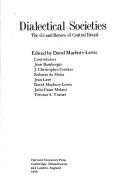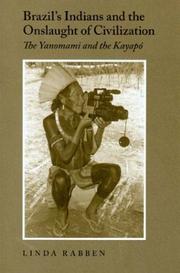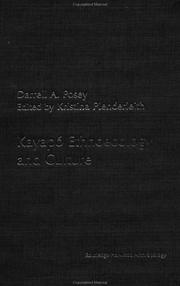| Listing 1 - 7 of 7 |
Sort by
|

ISBN: 0674202856 Year: 1979 Volume: 1 Publisher: Cambridge : Harvard University Press,
Abstract | Keywords | Export | Availability | Bookmark
 Loading...
Loading...Choose an application
- Reference Manager
- EndNote
- RefWorks (Direct export to RefWorks)
Gê Indians --- Bororo Indians --- Bororo (Indiens) --- #SBIB:39A74 --- Ge Indians --- -Ges Indians --- Ges-Tapuya Indians --- Jê Indians --- Tapuyan Indians --- Zé Indians --- Indians of South America --- Etnografie: Amerika --- Addresses, essays, lectures --- Gê Indians. --- Bororo Indians. --- -Etnografie: Amerika --- Gê Indians --- Ges Indians --- Biribocone Indians --- Borotuke Indians --- Borotuque Indians --- Coroados Indians

ISBN: 0295804521 9780295804521 0295983620 9780295983622 Year: 2004 Publisher: Seattle : University of Washington Press,
Abstract | Keywords | Export | Availability | Bookmark
 Loading...
Loading...Choose an application
- Reference Manager
- EndNote
- RefWorks (Direct export to RefWorks)
The Yanomami and Kayapó, two indigenous groups of the Amazon rainforest, have become internationally known through their dramatic and highly publicized encounters with “civilization.” Both groups struggle to transcend internal divisions, preserve their traditional culture, and defend their land from depredation, while seeking to benefit from the outside world, yet their prospects for the future seem very different. Placing each group in its historical context, Linda Rabben examines the relationship of the Kayapó and Yanomami to Brazilian society and the wider world. She combines academic research with a wide variety of sources, including celebrated leaders Paulinho Payakan and Davi Kopenawa, to assess how each group has responded to outside incursions.This book is a substantially revised edition of Unnatural Selection: The Yanomami, the Kayapó, and the Onslaught of Civilization, originally published in 1998, and includes a new chapter examining the controversy for anthropologists studying the Yanomami following the publication of Patrick Tierney’s book Darkness in El Dorado. Another new chapter focuses on the resurgence of Northeastern indigenous groups previously thought extinct. The magnitude and significance of indigenous movements has increased greatly, and a new generation of Brazilian indigenous leaders, proficient in Portuguese, is participating in the national political arena.Choice Outstanding Academic Title 2005
Social change --- Cayapo Indians --- Yanomamo Indians --- Change, Social --- Cultural change --- Cultural transformation --- Societal change --- Socio-cultural change --- Social history --- Social evolution --- Caiapo Indians --- Ibirayara Indians --- Kaiapó Indians --- Kayapo Indians --- Mẽbêngôkre Indians --- Gê Indians --- Indians of South America --- Shamatari Indians --- Shamathari Indians --- Yanoama Indians --- Yanomama Indians --- Yanomami Indians --- Yanonami Indians --- Cultural assimilation. --- Ethnic identity. --- Social conditions. --- Brazil --- Social policy. --- Ethnic relations.

ISBN: 0822326612 0822326655 9786613062246 1283062240 0822381419 Year: 2001 Publisher: Durham Duke University Press
Abstract | Keywords | Export | Availability | Bookmark
 Loading...
Loading...Choose an application
- Reference Manager
- EndNote
- RefWorks (Direct export to RefWorks)
How the Xavante Indians have reshaped the Brazilian government's policies of nationalism and assimiliation.
Indians of South America --- Xavante Indians --- #SBIB:39A74 --- Acua Indians --- Acua-Shavante Indians --- Acuen-Xavante Indians --- Akuen Indians --- Akwa Indians --- Akwe Indians --- Akwe Shavante Indians --- A'we Indians --- Chavante Acuan Indians --- Chavante-Akwẽ Indians --- Chavante Indians --- Crisca Indians --- Crixá Indians --- Eochavante Indians --- Oti Indians --- Pusciti Indians --- Puxití Indians --- Shavante-Akwẽ Indians --- Tapacuá Indians --- Xavante-Acuen Indians --- Gê Indians --- Government relations --- Etnografie: Amerika --- Government relations.
Book
ISBN: 0816547351 0816547343 Year: 2023 Publisher: Tucson : University of Arizona Press,
Abstract | Keywords | Export | Availability | Bookmark
 Loading...
Loading...Choose an application
- Reference Manager
- EndNote
- RefWorks (Direct export to RefWorks)
"This book is an ethnographic endeavor that explores age identity in the everyday A'uwe (Xavante) experiences at Pimentel Barbosa and Etenhiritipa villages, Central Brazil. It serves as an account of the formal and informal properties of the A'uwe life cycle that contribute to social identity, well-being, health, and environmental engagement. Welch examines the interplay between sociality and environmental relations, emphasizing the distinctiveness of the savanna environment and changing patterns in health conditions. Through environmental analyses, discussion of uses of fire, and the sensitive portrayals of individuals and events, the book develops arguments about how A'uwe understand well-being. The author uses observations from his many years living and working in A'uwe communities to create a portrait of contemporary Amazonian indigenous people and their environmental and social relations. This account is an argument for an understanding of A'uwe social organization as fundamentally plural, with age statuses and other aspects of social identity being numerous, simultaneous, interdependent, and contingent. The book aspires to be the new ethnographic go-to reference for Xavante society and cultural studies of groups in the Gê language family"--
Xavante Indians --- Xavante Indians. --- Social life and customs. --- Brazil --- Acua Indians --- Acua-Shavante Indians --- Acuen-Xavante Indians --- Akuen Indians --- Akwa Indians --- Akwe Indians --- Akwe Shavante Indians --- A'we Indians --- Chavante Acuan Indians --- Chavante-Akwẽ Indians --- Chavante Indians --- Crisca Indians --- Crixá Indians --- Eochavante Indians --- Oti Indians --- Pusciti Indians --- Puxití Indians --- Shavante-Akwẽ Indians --- Tapacuá Indians --- Xavante-Acuen Indians --- Gê Indians --- Indians of South America

ISBN: 1134471424 0415753783 1280098554 0203220196 9780203220191 9780415277914 0415277914 9786610098552 6610098557 9781134471423 9781134471379 1134471378 9781134471416 1134471416 9780415753784 0415277914 9781280098550 Year: 2002 Volume: 6 Publisher: London ; New York : Routledge,
Abstract | Keywords | Export | Availability | Bookmark
 Loading...
Loading...Choose an application
- Reference Manager
- EndNote
- RefWorks (Direct export to RefWorks)
Darrell A Posey died in March 2001 after a long and distinguished career in anthropology and ecology. Kayapó Ethnoecology and Culture presents a selection of his writings that result from 25 years of work with the Kayapó Indians of the Amazon Basin. These writings describe the dispersal of the Kayapó sub-groups and explain how with this diaspora useful biological species and natural resource management strategies also spread. However the Kayapó are threatened with extinction like many of the inhabitants of the Amazon basin. The author is adamant that it is no longer satisfactory for s
Cayapo Indians --- Ethnoecology --- Caiapo Indians --- Ibirayara Indians --- Kaiapó Indians --- Kayapo Indians --- Mẽbêngôkre Indians --- Gê Indians --- Indians of South America --- Indigenous peoples --- Human ecology --- Traditional ecological knowledge --- Ethnobotany. --- Ethnobiology. --- Agriculture. --- Ecology --- Gorotire (Brazil) --- Social life and customs. --- Environmental conditions. --- Aboriginal peoples --- Aborigines --- Adivasis --- Indigenous populations --- Native peoples --- Native races --- Ethnology --- Ethnobotany --- Ethnobiology --- Agriculture --- Social life and customs --- Environmental conditions --- Cayapo Indians - Ethnobotany --- Cayapo Indians - Ethnobiology --- Cayapo Indians - Agriculture --- Indigenous peoples - Ecology - Brazil - Gorotire --- Gorotire (Brazil) - Social life and customs --- Gorotire (Brazil) - Environmental conditions
Book
ISBN: 1477317414 1477317392 9781477317402 1477317406 9781477317396 Year: 2019 Publisher: Austin University of Texas Press
Abstract | Keywords | Export | Availability | Bookmark
 Loading...
Loading...Choose an application
- Reference Manager
- EndNote
- RefWorks (Direct export to RefWorks)
The Indigenous Canela inhabit a vibrant multispecies community of nearly 3,000 people and over 300 types of cultivated and wild plants living together in Maranhão State in the Brazilian Cerrado (savannah), a biome threatened with deforestation and climate change. In the face of these environmental threats, Canela women and men work to maintain riverbank and forest gardens and care for their growing crops, whom they consider to be, literally, children. This nurturing, loving relationship between people and plants—which offers a thought-provoking model for supporting multispecies survival and well-being throughout the world—is the focus of Plant Kin. Theresa L. Miller shows how kinship develops between Canela people and plants through intimate, multi-sensory, and embodied relationships. Using an approach she calls “sensory ethnobotany,” Miller explores the Canela bio-sociocultural life-world, including Canela landscape aesthetics, ethnobotanical classification, mythical storytelling, historical and modern-day gardening practices, transmission of ecological knowledge through an education of affection for plant kin, shamanic engagements with plant friends and lovers, and myriad other human-nonhuman experiences. This multispecies ethnography reveals the transformations of Canela human-environment and human-plant engagements over the past two centuries and envisions possible futures for this Indigenous multispecies community as it reckons with the rapid environmental and climatic changes facing the Brazilian Cerrado as the Anthropocene epoch unfolds.
Canella Indians --- Cerrado ecology --- Sustainable living --- Human-plant relationships --- Traditional ecological knowledge --- Ethnobotany. --- Indigenous ecological knowledge --- Indigenous environmental knowledge --- T.E.K. (Traditional ecological knowledge) --- TEK (Traditional ecological knowledge) --- Traditional environmental knowledge --- Ethnoscience --- Experiential learning --- Biopiracy --- Ethnoecology --- Man and plants --- Man-plant relationships --- Plant-human relationships --- Plant-man relationships --- Plants and man --- Relationships, Human-plant --- Human beings --- Plants --- Botany, Economic --- Ethnobotany --- Synanthropic plants --- Ecological living --- Green living --- Living, Sustainable --- Alternative lifestyles --- Environmentalism --- Green movement --- Cerrados --- Ecology --- Canela Indians (Brazil) --- Capiekrans Indians --- Kanela Indians (Brazil) --- Krenkataje Indians --- Gê Indians --- Indians of South America --- #SBIB:39A74 --- #SBIB:39A4 --- Etnografie: Amerika --- Toegepaste antropologie

ISBN: 0231076606 Year: 1992 Publisher: New York (N.Y.): Columbia university press
Abstract | Keywords | Export | Availability | Bookmark
 Loading...
Loading...Choose an application
- Reference Manager
- EndNote
- RefWorks (Direct export to RefWorks)
Cayapo Indians --- -Cayapo Indians --- -Economic development --- -Frontier and pioneer life --- -Land settlement --- -Nature --- -Resettlement --- Settlement of land --- Colonies --- Land use, Rural --- Human settlements --- Border life --- Frontier and pioneer life --- Homesteading --- Pioneer life --- Adventure and adventurers --- Manners and customs --- Pioneers --- Development, Economic --- Economic growth --- Growth, Economic --- Economic policy --- Economics --- Statics and dynamics (Social sciences) --- Development economics --- Resource curse --- Caiapo Indians --- Ibirayara Indians --- Kaiapó Indians --- Kayapo Indians --- Mẽbêngôkre Indians --- Gê Indians --- Indians of South America --- Land tenure --- Social conditions --- Environmental aspects --- -Environmental aspects --- -Effect of human beings on --- -History --- Para (Brazil : State) --- -Para (Brazil : State) --- -Economic conditions --- Nature --- Economic development --- Land settlement --- Effect of human beings on --- Land tenure. --- Social conditions. --- Economic conditions. --- -Land tenure --- Resettlement --- History --- Grão-Pará (Brazil : State)
| Listing 1 - 7 of 7 |
Sort by
|

 Search
Search Feedback
Feedback About UniCat
About UniCat  Help
Help News
News